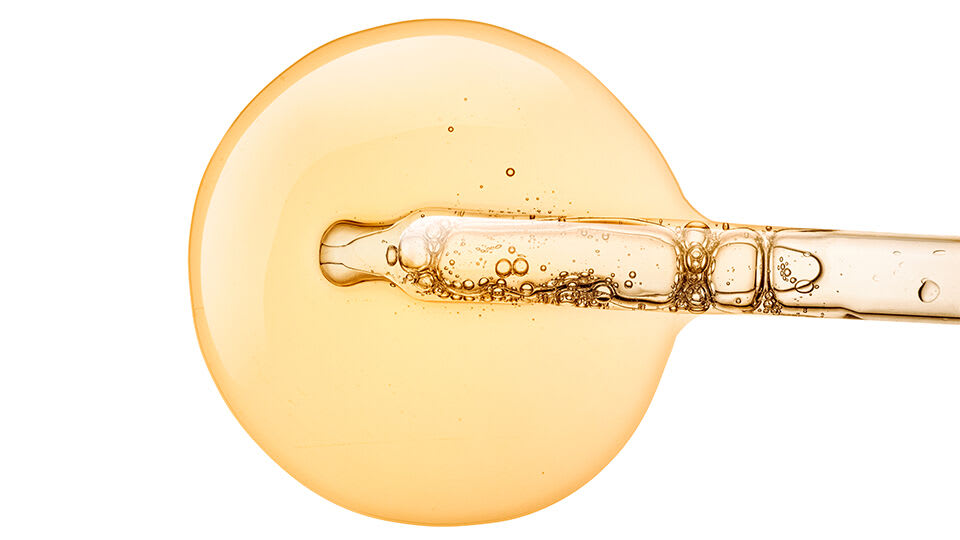Retinol is one of the most powerful actives in your skincare routine—but it’s not the only one. Alternatives, like bakuchiol, also show promising results. We uncover which is right for your skin.

There are few ingredients as touted as retinol. Heralded by dermatologists, aestheticians, and skin experts as the be-all and end-all. But, as many users know, retinol comes with its own long list of extreme woes, including irritation, flaking, strict application methods, and increased sun sensitivity. But what about retinol alternatives, like bakuchiol? Do they work as well as retinol, minus the intense side effects? Keep reading to uncover the basics about retinol, retinol alternatives, and which ingredients to shop for instead.
What Is Retinol?
Retinol is simply the pure form of Vitamin A. Vitamin A can dramatically affect the skin’s surface, addressing signs of aging, uneven skin tone, and clogged pores. The reason experts enthusiastically approve of retinol for many of their clients is the impressive and innumerous scholarly studies that show the proven benefits of retinol and its dramatic impacts on skin. It’s available in both over-the-counter products as well as prescription strength for even quicker and deeper results.
But we’d be remiss to not mention the other aspect of retinol use: severe side effects. Regular retinol usage can leave some skin excessively dry, flaky, and constantly inflamed. And a common part of using retinol is accepting the phase called “purging”, which includes a surge of acne, rashes, flaking, and intense redness. This extreme irritation may only be temporary, but it’s one of many reasons (including not being safe for pregnancy) that we at Tatcha never formulate with retinol.
What Is Bakuchiol?
Bakuchiol is a botanical extract derived from the psoralea corylifolia plant. Native to India, the plant has long been used in Ayurvedic practices, as well as traditional Chinese medicine, for its anti-inflammatory benefits both topically and internally. No matter its source, users are all asking the same question: Is bakuchiol as effective as retinol? In a double-blind, placebo-controlled study, bakuchiol was proven to address signs of aging: helping to decrease the appearance of fine lines and wrinkles, as well as minimize the signs of hyperpigmentation. The results were as significant as retinol, but without the flaking or irritation that comes with Vitamin A use. Bakuchiol has also been proven to stimulate collagen and aid in cellular turnover, making it a promising (and more tolerable) alternative to retinol. That said, expect slower results with bakuchiol, which takes longer to achieve results versus more aggressive retinol formulas.
Bakuchiol vs. Retinol
Looking to increase the appearance of skin’s firmness, reduce the look of fine lines and wrinkles, and visibly even skin tone? Both retinol and bakuchiol can help accomplish this.
While more scientific studies are needed for definitive proof, bakuchiol has been shown to provide comparable results to retinol. In that same 2019 study, users that applied 0.5 percent bakuchiol twice a day for 12 weeks found similar results with wrinkle and hyperpigmentation reduction as once daily retinol users. Retinol did slightly outperform the bakuchiol group, but the bakuchiol users had less irritation and flaking.
But which is better for you—retinol or bakuchiol? Here are a few things to consider before purchasing either a bakuchiol serum or retinol product.
Comparison Chart
| RETINOL | BAKUCHIOL |
|---|---|
Pros:
| Pros:
|
Cons:
| Cons:
|
Usage:
| Usage:
|
Sensitive skin?
| Sensitive skin?
|
Which Is Better for Sensitive Skin?
Does your skin identify as “sensitive”? You’re not alone. It’s estimated that up to 70 percent of people may have sensitive skin now. If you find yourself in this (well-populated) group, bakuchiol is ideal for you. It gives the benefits of retinol with noticeable improvements in fine lines, pigmentation, and firmness, with fewer noted incidences of irritation or sensitization. Some users of bakuchiol in that 2019 study showed noticeable redness, but it lessened as usage continued.
Application Frequency
Always on the go and expect your skincare products to be too? Retinol needs a set routine, with regimented and timed application schedules—ideally increasing frequency with each week and applying on dry, clean skin or atop lotions. While it provides drastic benefits, it also provides extreme confusion and rules. A bakuchiol, or retinol alternative, serum can simply be applied on the go—ideally twice a day, morning and night—with little worry of sensitivity retaliation. That said, it does still have a few notated common irritations for sensitive skin at the start of usage, including redness, slight irritation, and dryness. For the impressive results shown in the 2019 study, the users used bakuchiol twice a day for at least three months to assess wrinkle-reducing results. They also started with 0.5 percent strength formulas, which can perform similar to 0.5 percent retinol.
Results Timeline
Looking for a quick fix? Bakuchiol can provide results starting around six weeks—if used twice a day. Over-the-counter retinol products (found in drugstores and luxury retailers) take traditionally around four to six months to see visible results, while powerful prescription-strength creams can take merely a few weeks.
Which Is Better for Acne-Prone Skin?
Prone to acne? Retinol can provide impressive acne relief after the potential purge stage, as well as address surface-level acne scarring. Bakuchiol is also effective for acne-prone skin. It’s naturally antibacterial so it’s great for soothing and reducing the appearance of not only irritation, but also acne.
A Note About Sun Exposure
Regularly spend time outdoors? Retinol can unfortunately make you more susceptible to sun damage because of the increased skin cell turnover, notes the Skin Cancer Foundation. Additionally, sunlight decreases the efficacy of the retinol, meaning it won’t work as well on the skin during the daytime or if exposed to light in the bottle (which is why retinol packaging should be air and light protected). But bakuchiol is stable in sunlight and isn’t linked to increased sun sensitivity.
That said, no matter which product you select in this bakuchiol vs. retinol battle, you should be wearing sunscreen every single day. The most important product you can use in your skincare ritual is broad-spectrum SPF.
Pairing Retinol and Bakuchiol
If retinol is great and bakuchiol is great—can their greatness be combined? Can you use bakuchiol with retinol? Surprisingly, yes, in fact, when paired together, they might even work better. That 2019 randomized study found that bakuchiol calming and stabilizing nature allowed the skin to tolerate retinol better. But—for some sensitive skin users, this can cause double the irritation, so patch test first and take it slow to ensure skin can handle both products simultaneously.
Bottom line in this retinol vs bakuchiol battle? Both ingredients don’t have to work against one another, they can be seen as cousins, working together in tandem to help your skin. Additionally, many retinol users might enjoy switching to bakuchiol in the summer months, as retinol can increase sun sensitivity and increase chances of sun damage. Or if you’re a first time user, bakuchiol might be a great place to start, allowing skin to get used to the cellular turnover and then introduce retinol in its place eventually.
Retinol and Bakuchiol Alternatives
Each formula has remarkable benefits, as well as woes. Assess which one fits your skin type, needs, and lifestyle, and consult with your doctor if you have any questions or concerns. Also, bakuchiol isn’t the only retinol-alternative on the market. Tatcha has found incredible results with a few up-and-coming ingredients, including upcycled cranberry extract and sea fennel—both are combined in The Silk Serum for the ultimate sensitive skin-approved serum for fine line and wrinkles.
Cranberry Extract
Cranberry is perhaps best known for its delicious flavor, but the humble ingredient is also surprisingly a superfood, both when consumed and applied topically. Cranberry extract is full of antioxidants, collagen, and elastin that support the skin’s healthy appearance, radiance, and barrier function. The superfruit is also a potent active ingredient with natural peptides that address the appearance of aging, helping to boost skin structure and firmness. With consistent usage, the cranberry extract eases dryness, reduces the appearance of wrinkles, and imparts skin with a healthy glow—thus making a great natural retinol alternative.
Sea Fennel
Sea fennel is a marine botanical, grown in or along the water. Commonly used in the kitchen, thanks to its tasty, salty notes, sea fennel is also a wonderful addition to your skincare routine. It naturally has retinol-like properties, stimulating the skin to increase collagen production as well as helping with skin’s natural exfoliation process.
Sea fennel is packed with radiance-boosting ingredients, like vitamins A, C, and E, plus peptides. Sea fennel’s natural iteration of vitamin A is much more gentle on the skin’s surface, allowing it to exfoliate, reduce pigmentation, and boost collagen, while remaining calming and soothing to the skin. In fact, the extract generates no inflammation on the skin, meaning it’s incredibly soothing to the skin’s barrier. Lastly, the extract’s peptides help to support skin’s firmness, smoothness, and youthful appearance.

